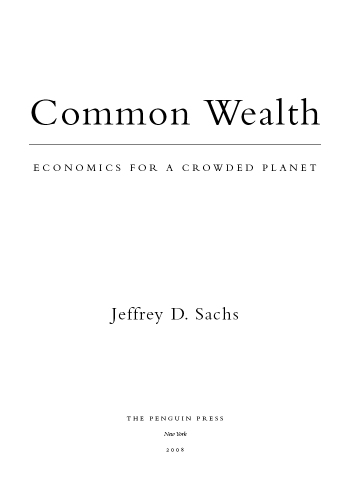
Common Wealth
Economics for a Crowded Planet
کتاب های مرتبط
- اطلاعات
- نقد و بررسی
- دیدگاه کاربران
نقد و بررسی

January 28, 2008
In this sobering but optimistic manifesto, development economist Sachs (The End of Poverty
) argues that the crises facing humanity are daunting—but solutions to them are readily at hand. Sachs focuses on four challenges for the coming decades: heading off global warming and environmental destruction; stabilizing the world's population; ending extreme poverty; and breaking the political logjams that hinder global cooperation on these issues. The author analyses economic data, demographic trends and climate science to create a lucid, accessible and suitably grim exposition of looming problems, but his forte is elaborating concrete, pragmatic, low-cost remedies complete with benchmarks and budgets. Sachs's entire agenda would cost less than 3% of the world's annual income, and he notes that a mere two days' worth of Pentagon spending would fund a comprehensive antimalaria program for Africa, saving countless lives. Forthright government action is the key to avoiding catastrophe, the author contends, not the unilateral, militarized approach to international problems that he claims is pursued by the Bush administration. Combining trenchant analysis with a resounding call to arms, Sachs's book is an important contribution to the debate over the world's future.

February 15, 2008
In his first book, "The End of Poverty", development economist and UN special adviser Sachs laid out how extreme poverty in places like Africa could be alleviated. Here, he identifies and offers strategies for dealing with the leading global threats of the coming decades, such as environmental degradation, overpopulation, and resource depletion, arguing persuasively that much of the threat to humanity comes from those living in extreme poverty. He calls for wealthy nations to invest in efforts to improve the conditions of the extremely poor and thereby lessen the impact of extreme poverty on the planet. He explains in detail the goals that need to be met and how governments, not-for-profits, the private sector, and even individuals, can cooperate to achieve them. He reserves much of his criticism for the United States, which he says spends far too much on military technology that will prove ineffective in dealing with the true threats to our security. Though Sachs avoids jargon and writes clearly, the book would be heavy going for casual readers. Nevertheless, his work is an eloquent plea and a solid argument for global economic and political cooperation. Highly recommended for most libraries. [See Prepub Alert, "LJ" 4/15/07.]Lawrence R. Maxted, Gannon Univ., Erie, PA
Copyright 2008 Library Journal, LLC Used with permission.

February 15, 2008
In his best-selling End of Poverty (2005), economist Sachs escorted readers to some of the worlds poorest countries and suggested nine strategies that together constitute a comprehensive plan for replacing poverty with sustainable prosperity while also addressing environmental degradation and other threats to geopolitical security. His latest book reiterates the call to action and reminds readers that the gravest threatsfacing rich and poor alikearise from highly interrelated economic and environmental problems, a function of our increasingly overcrowded and ecologically confused planet. In part, Sachs is responding to criticism of his previous work by William Easterly and others who advocate a more fragmentary trial-and-error approach to the worlds development problems. More broadly, this is an argument for a new global architecture for geopolitical problem-solving, one that emphasizes science and recognizes the inherent interdependence of corporations, nonprofits, research universities, and governments. As always, Sachs condenses a bewildering volume of statistical data into an accessible form, neatly sums up his core arguments in bullet-point lists, and somehow manages to leave one feeling optimistic about the future of the planet.(Reprinted with permission of Booklist, copyright 2008, American Library Association.)

























دیدگاه کاربران